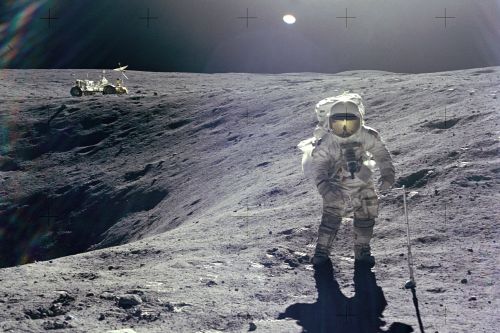The passing of the moon walkers

Lunar module pilot Charles M. Duke Jr. collecting samples during the Apollo 16 mission on April 21, 1972. Duke, the youngest person to walk on the Moon, is now 73 years old. (Photo information)
Jennifer and I finished watching the 1998 HBO miniseries From the Earth to the Moon last night. If you’ve seen it, you know how good it is; if you haven’t, and you have any interest in human spaceflight, what the hell is wrong with you? Get it right now: Amazon.com, Amazon.ca.
Anyway, it’s triggered (or rather, reawakened) a fairly passionate interest in the history of NASA, so expect a few posts in this vein in the near future. (Consider yourself warned.) Including this one:
Of the 24 astronauts who have travelled to the moon,1 six have since died:
- Jack Swigert (Apollo 13) died in 1982 from bone cancer shortly after being elected to Congress; he was 51.
- Ronald Evans (Apollo 17) died of a heart attack in 1990 at the age of 56.
- James Irwin (Apollo 15) died in 1991 at the age of 61. He had developed arrhythmia during the mission, and died after a series of heart attacks. He was the eighth person to walk on the Moon.
- Stuart Roosa (Apollo 14) died in 1994 due to complications from pancreatitis; he was 61.
- Alan Shepard (Apollo 14) — the first American in space — died in 1998 from leukemia at the age of 74. He was the fifth person to walk on the Moon.
- Pete Conrad (Apollo 12) died in 1999 at the age of 69, after a road accident. He was the third person to walk on the Moon.
The remaining 18, nine of whom have walked on the Moon, range in age from 73 to 81 as I write this:
- Frank Borman (Apollo 8) is 81.
- Jim Lovell (Apollo 8 and 13) is 80.
- Buzz Aldrin (Apollo 11) and Dick Gordon (Apollo 12) are 79.
- Neil Armstrong (Apollo 11), Michael Collins (Apollo 11), Ed Mitchell (Apollo 14), Tom Stafford (Apollo 10) and John Young (Apollo 10 and 16) are 78.
- Alan Bean (Apollo 12) and Al Worden (Apollo 15) are 77.
- David Scott (Apollo 15) is 76.
- William Anders (Apollo 8), Gene Cernan (Apollo 10 and 17) and Fred Haise (Apollo 13) are 75.
- Charles Duke (Apollo 16), Ken Mattingly (Apollo 16) and Harrison Schmitt (Apollo 17) are 73.
The reason I mention this is that, according to Wikipedia’s list of Constellation missions, the first manned lunar landing since Apollo 17 is scheduled for June 2019 — a little more than 10 years from now, and almost 50 years since Apollo 11. At that point, Charles Duke, Ken Mattingly and Jack Schmitt will be 83 years old; Frank Borman and Jim Lovell will be in their nineties.
It’s entirely possible — especially if the Constellation program suffers any further delays — that by the time human beings get back to the Moon, few, if any, of the men who went the first time will still be alive.
For some reason that thought makes me quite sad.
1 I’m using the number cited in From the Earth to the Moon, which includes command module pilots and others (Apollo 8, 10 and 13) who travelled to the Moon but did not land on its surface. This also excludes Apollo 7 and 9, which did not leave Earth orbit.